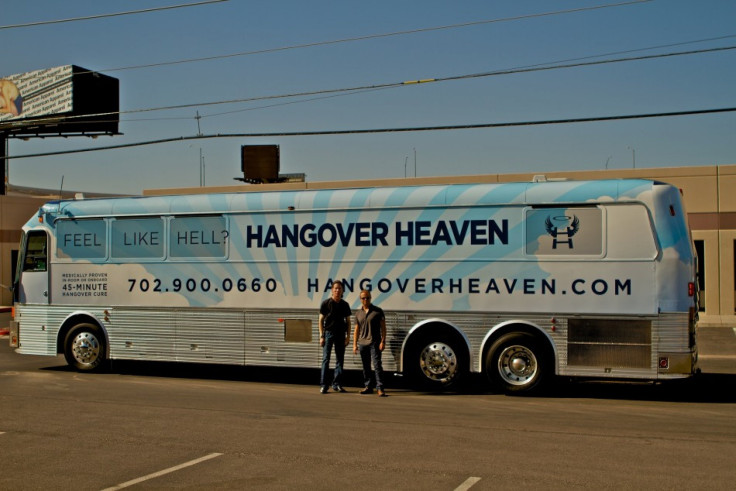Hangover Heaven Bus Promises Partiers Hangover Cure

A hangover is the expected, but still unpleasant, price to pay for a long night of drinking. The headache, nausea, intense thirst and sensitivity to light and noise can be debilitating, and if you're on vacation, it can mean an entire day wasted hiding under the blankets. But if you've partied too hard in Vegas, an anesthesiologist named Dr. Jason Burke may have just the thing to cure you - - Hangover Heaven, an after-party bus for the morning after.
Burke travels up and down the Las Vegas strip picking up patients. He gives them IV fluids and some other drugs he says are used 10,000 times a day in hospitals. He claims he can cure 95 percent of hangovers in 45 minutes.
People here start drinking at noon and drink until 2 a.m., and they don't want to be miserable in their hotel rooms, Burke told CBS News. They want to go on a helicopter ride or go shopping.
Burke offers three kinds of treatments: Salvation, redemption and in-room treatment, with costs ranging from $130 to $500. Pricey, yes, but Burke said the trained medical staff and FDA approved drugs justify the expense.
It's not an inexpensive service to provide, especially to do it well, he told CBS News.
But what causes a hangover? And is there really anyway to prevent or cure one?
Sure, we know that hangovers are the product of drinking too much. But too much is not a quantifiable term. Many factors such as hydration, how much you slept and what you had to eat play a role in determining not only if you will get a hangover, but how severe it will be.
Alcohol increases urination and causes dehydration, which leads to the severe thirst that accompanies a hangover. In addition, alcohol increases the production of stomach acid, leading to nausea and vomiting, causes a drop in blood sugar, resulting in weakness, tiredness and moodiness, and dilates blood vessels, causing severe headaches.
In addition, congeners, alcoholic by-products that occur during fermentation, contribute to hangover symptoms. A 2009 study found that distilled drinks, such as vodka, do not contribute to hangovers as heavily as drinks with congeners present, such as whiskey, rum or brandy.
There are several purported remedies to cure a hangover, many of which have been tested by scientists. A 2000 study published in the Annals of Internal Medicine found that rehydration with water, electrolytes or IV fluids was effective at reducing symptoms and lessening the severity of the symptoms. Other remedies, such as eating greasy foods and breathing pure oxygen were not found to be effective.
Hair of the dog, drinking a little bit of alcohol to lessen the symptoms, is another popular remedy. However, a 1998 study found not only that a cocktail in the morning doesn't work, it contributes to alcoholism.
Spacing out your drinks and staying hydrated by drinking water in between drinks may help prevent hangovers, according to the study.
Overall, no remedy is as effective as not drinking, according to the British Medical Journal.
No compelling evidence exists to suggest that any conventional or complementary intervention is effective for preventing or treating alcohol hangover, a 2005 report concluded. The most effective way to avoid the symptoms of alcohol induced hangover is to avoid drinking.
Burke said just because his Hangover Heaven Bus can help get rid of hangovers, people shouldn't use it as an excuse to binge drink.
I think the (hangover cure) doesn't replace judgment, he told CBS. Anyone should be drinking responsibly. I think that the possibility that this should help shouldn't change responsible drinking.
© Copyright IBTimes 2024. All rights reserved.




















